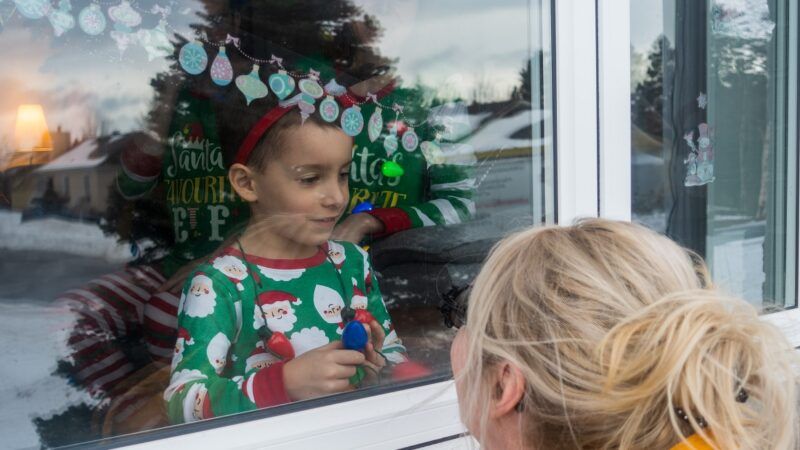Restore Pre-Pandemic Freedom, For the Children
Deprived of social interaction for a period of time that constitutes a significant percentage of their short lives, kids are falling apart.

The year-plus of the pandemic has been an unpleasant experiment in just how far previously free-ish countries could be subjected to command-and-control systems without exciting rebellion and pushing them past the breaking point. The uncomfortable evidence is that many people willingly suffer massive impositions before resisting, though others chafe and are eager to resume some semblance of normal life. But how much damage has been done to children who have been at the mercy of officials who seized control and adults who failed to resist? In an era when every policy seems to be justified as "for the children," pandemic lockdown pain is definitely something done to them.
"The coronavirus pandemic has been hitting adolescents hard," science journalist Melinda Wenner Moyer noted last week in UnDark. "During the teen years, friendships matter more than almost everything else… But this year, teens have been forced to stay home and avoid real-world interactions with their friends. They have had to spend their days denied of their deepest needs while, in some cases, taking on more responsibilities — yet without many of the emotional supports they had in the past."
"Rarely have America's children suffered so many blows, and all at once, as during the pandemic's lost year, Andrea Petersen reported in a similar piece for the Wall Street Journal. "The crisis has hit children on multiple fronts. Many have experienced social isolation during lockdowns, family stress, a breakdown of routine and anxiety about the virus."
Both stories cite awful examples, and science supports the anecdotes.
"Posttraumatic, anxiety, and depression disorders are expected during and aftermath of the pandemic," cautioned a September 2020 article in the International Journal of Disaster Risk Reduction. "Some groups, like children, have more susceptibility to having long term consequences in mental health."
"[C]hildren's depression ratings significantly increased during the lockdown, relative to 18 months beforehand," found a November 2020 article on the results of lockdowns in the UK in the Archives of Disease in Childhood.
From April through October of 2020, emergency room visits in the United States for mental health reasons increased by 24 percent for kids 5- to 11-years-old, and by 31 percent for 12- to 17-year-olds, according to the Centers for Disease Control and Prevention.
Anecdotally, my wife, a pediatrician, has seen a huge surge in depression, anxiety, and self-harm in the months of the pandemic. Deprived of social interaction with classmates, teammates, and friends for a period of time that constitutes a significant percentage of their short lives, kids are falling apart. Too many of them are having suicidal thoughts in a world distorted beyond recognition and acceptability. And there's no doubt as to the culprit.
"Pandemic life is not conducive to normal developmental events and this is having a significant impact," comments Mamilda Robinson, a specialty director and clinical instructor of psychiatric mental health at Rutgers School of Nursing.
It didn't have to be this way. During past pandemics, nobody ordered more-or less free societies to grind to a halt or tried to coerce their populations into isolation from one another. Weirdly, the public health professionals behind the lockdowns took their inspiration from totalitarian China, a country ruled by a government that espouses values entirely hostile to those of free societies.
"It's a communist one party state, we said," Professor Neil Ferguson, a prominent advisor to the British government on pandemic policy, told the Times of London in December. "We couldn't get away with it in Europe, we thought… and then Italy did it. And we realised we could." (UnHerd offers an unpaywalled summary.)
The result was that "[a]cross the world in 2020, citizens experienced the biggest rollback of individual freedoms ever undertaken by governments during peacetime (and perhaps even in wartime)," The Economist's Democracy Index 2020 observed of the world's pandemic response. "The willing surrender of fundamental freedoms by millions of people was perhaps one of the most remarkable occurrences in an extraordinary year."
"Willing" may be an overstatement about the reaction of those—in America and elsewhere—who protested and defied restrictions. It is certainly not an accurate characterization of the children who were dragged into an isolated and unnatural existence by adults.
And why were kids dragged into isolation that troubles even adults who have greater perspective and emotional resources when children are among those with the least vulnerability to COVID-19?
"Children, including very young children, can develop COVID-19," according to information posted by the Harvard Medical School. "Many of them have no symptoms. Those that do get sick tend to experience milder symptoms such as low-grade fever, fatigue, and cough."
Some children, especially those with underlying health conditions might get very sick. And there's potential for them to pass the illness to those who are more vulnerable. But, as we've seen over the past year, children are especially endangered by isolation, the disruption of normal routine, and lack of contact with friends. They're at much more risk from the lockdown policies implemented to fight the pandemic than they are from the virus itself.
A more rational response to the pandemic might have focused on offering protective measures to those at greatest risk from the disease, allowing adults to choose their own tradeoffs between risk and isolation. A rational approach would have certainly emphasized maintaining as much normality as possible for children and adolescents who need social contact with peers and friends in order to develop normally and happily.
The woefully regrettable authoritarian experiment of the past year will leave a mark on people's sanity, prosperity, and relations with one another for years to come. It's certainly going to leave an unpredictable, but probably unfortunate, legacy for the youngest among us for whom the pandemic will be a defining event in their lives. An apology isn't enough; we need to restore pre-pandemic freedom for the children.

Show Comments (78)